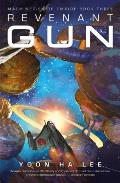
| Series: | Machineries of Empire #3 |
| Publisher: | Solaris |
| Copyright: | 2018 |
| ISBN: | 1-78618-110-X |
| Format: | Kindle |
| Pages: | 400 |
This is an ebook, so metadata may be inaccurate or missing. See notes on ebooks for more information.
This is the third book of the series that started with Ninefox Gambit, and it really can't be read out of order. Each book builds on the previous one and picks up where it left off in the story.
Jedao wakes up with the memory of being a first-year Shuos university student, in a strange room, with nothing to wear except a Kel uniform (wearing a Kel uniform when you aren't Kel is a very bad idea), and with considerably more muscle than he remembered. The first person he sees identifies himself as the Nirai hexarch, which is definitely not the sort of thing that happens to a first-year Shuos university student (even putting aside that the heptarchate is apparently now the hexarchate). The odd bits of knowledge he shouldn't have only make things stranger, as does the hexarch's assertion that his opponent has made off with most of his memories. And now, apparently he's expected to command a battle fleet in support of the last remaining legitimate hexarch.
The main story arc of Revenant Gun picks up nine years after the shattering events of Raven Strategem, although the chapters focusing on Kel Brezan are intermixed flashbacks sketching out the subsequent history. Given how much the political universe shifts in the first two books, I have to avoid most of the plot summary. But the focus shifts here from the primarily combat-oriented Ninefox Gambit and the Kel politics of Raven Strategem to broader-focus political maneuvering. Lee left a lot of broken pieces on the floor at the end of the last book; Revenant Gun is largely about putting them back together while taking care of a few critical remaining threats.
But, despite the political rumblings and continued war, I thought the best part of this book was a quiet thread about servitors (essentially Star Wars droids with roughly the same expected place in hexarchate society, except in smaller and less human forms). This follows Hemiola, one of three servitors stationed on an isolated moon and tasked with watching over the secret archives of one of the main players in this story. Over the course of the story, Hemiola's horizons expand drastically and unsettlingly, something it tries to make sense of by analogy with the episodic dramas it watches (and creates fan videos for, not that it shares those with anyone). The quietly subversive way that Cheris treats servitors from the start of this series is one of the best themes in it, and I was delighted to finally see the world from a servitor's point of view. I'd happily read a whole other book about Hemiola and the servitors (and there is a possible hook left for that at the end of this one).
The rest of the story involves more of the high-stakes strategic maneuvering that's characterized the series so far, this time (mostly) three-sided. We find out quite a bit more about what was behind the shape and political structure of the universe, a lot more about Kujen, and at least a bit more about the plan behind the upheaval in Raven Strategem, but most of the book is Jedao and Brezan trying to keep up with events, struggle through ethical challenges, and find the best of a very limited and unpleasant set of options. One thing I like about Lee's writing is that all of the characters are smart and observant, and very little of the plot is driven by stupid mistakes or poor communication.
I liked Revenant Gun better than any of the other books in this series. I think it almost came together as a great book, but didn't quite manage it, although I'm not sure what didn't work. One thing I can put a finger on is that Jedao's situation has a sexual dimension that's in-character and that fits the world but felt weirdly sudden and intrusive in the story. This may have been intentional (there's some reason to believe that it felt weirdly sudden and intrusive to Jedao), but it was disconcerting in a way that knocked the plot off-kilter, at least for me. The ending also felt oddly incomplete in some way, despite dealing with the major villain of the series. There are so many loose ends left: how to stabilize the government, how the new calendar would be managed, and what is going on with the servitors (as well as a new and nicely-handled addition to the political scene). The ending leaves them mostly unresolved, instead focusing on Jedao and his psychological state. I was somewhat interested in that, but more interested in other characters and in the politics, and wanted more of a higher-level conclusion.
Despite those flaws, though, this is still good magitech, with some interesting characters, some great bits with the servitors, good use of multiple perspectives, and a story that I found easier to follow and more straightforward than earlier books in the series. If you liked the previous books, you'll want to read this too. I'm hoping for a sequel someday that focuses entirely on the servitors, though.
Reviewed: 2018-12-18